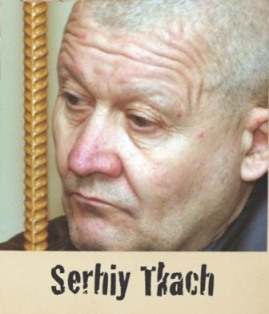THE POLOGOVSKY MANIAC

Name: Serhiy Tkach
DOB: 12 September 1952
Profession: Labourer
Aliases: The Pologovsky Maniac
Previous convictions: None (accused of fraud)
Number of victims: 36 to over 100
Short in stature, a quiet man who shied away from eye contact, Serhiy Tkach didn’t much look like a murderer, yet for a quarter of a century he took one life after another. It’s possible that he was the most prolific serial killer in Ukrainian history. After he was caught, Tkach would happily tell anyone who would listen that his victims numbered over one hundred. This was no confession, but a boast. Tkach was, and remains, proud of the murders he committed.
Serhiy Tkach was born on 12 September 1952 in Kiselyovsk, a Russian city that was then a part of the Soviet Union. By all accounts he did well academically, though he wasn’t much interested in higher learning. After fulfilling his compulsory military service, Tkach continued his studies briefly in order to become a police officer. Upon graduation, he became a criminal investigator in Kemerovo, an industrial city in the central Soviet Union. However, what looked to be a long, successful career in law enforcement ended abruptly when Tkach was caught committing fraud. He was only able to avoid prison by writing a letter of resignation.
According to Tkach, he killed for the first time in 1980, not long after his exit in disgrace from the police department. A pleasant, pastoral afternoon, fuelled by numerous bottles of wine, turned horrific when the then 27-year-old grabbed a young woman, dragged her into the bushes and strangled her. Rape, he told one reporter, was his intent; the murder had taken place only because he was fearful that his victim might somehow escape before he’d completed the assault.

The city of Kemerovo, where Tkach worked as a criminal investigator before embarking on his insane spree of killings
Into the cold
Tkach never identified the woman by name, saying only that she was a former schoolmate whom he had dated on and off for nine years. He added that, in all that time, the two had not had sexual relations. Tkach claimed that on the day of her death, the unnamed woman had slapped his face at the mere suggestion.
‘Do you want to know why I killed?’ he asked one journalist. ‘My main motive was revenge!’
After he returned home, Tkach called the police to report his crime, but was irritated when the officer on the other end of the line refused to identify himself.
‘I was going to tell him where to find the corpse,’ Tkach told investigators pursuing the case. ‘I was going to help my former colleagues, but changed my mind.’ With the loss of his respected position in law enforcement, Tkach became a man adrift. The former criminal investigator worked in mines, on farms and as a low-paid factory worker. He moved from one city to another, leaving a trail of cold bodies in his wake.
Tkach was as meticulous as he was calculating. He was always careful to strip his victims of their jewellery and clothing, some of which he would keep as a trophy. Tkach used his police training in making certain that no fingerprints or traces of semen would be left behind. So as to lend the impression that his murders had occurred far away, he left the bodies close to roads and railways.
It’s likely that the most of the murders took place in Ukraine. He killed in the cities of Zaporizhia, Kharkov and, finally, in Dnipropetrovsk, where he lived his final years as a free man.

Ex-policeman Tkach used his specialized knowledge to escape along railway lines treated with tar to throw police dogs off the scent
The vast majority of Tkach’s known victims were between 9 and 17 years of age, a fact that has led to doubts about the story of his first killing. His final victim, a 9-year-old identified in the media only as ‘Kate’, was the daughter of one of Tkach’s friends. The girl had been playing with four other children one August 2005 day when she was grabbed. Tkach drowned the girl and, as he had with so very many others, left the body to be found.
Zeroing in on a child whom he had known and carrying out the abduction in front of her friends was uncharacteristically sloppy. Tkach pushed his luck even further by attending the little girl’s funeral. He was recognized immediately by her playmates. The former criminal investigator would later express regret that he hadn’t bothered to kill them as well.
Tkach was soon dubbed ‘The Pologovsky Maniac’ after the area of Dnipropetrovsk he had called home. News of his crimes came as a shock to neighbours. Known as a former criminal investigator, the killer had a certain stature within the immediate community. While he was a bit of a loner, and a man of few words, these qualities only added to Tkach’s reputation as someone who was highly intelligent. True, Tkach had two failed marriages in his past, but he appeared for all the world to be a devoted husband to wife number three. Unlike so many men in his neighbourhood, he never said a negative word about women. As far as anyone knew, he’d never so much as raised a hand against his wife and four children.
No remorse
More than two years passed before Tkach was put on trial. Much of the delay had to do with the significant challenges that faced investigators.
It wasn’t that they had no experience of investigating serial killers – the previous decade, Anatoly Onoprienko, ‘The Beast of Ukraine’, had been convicted of 52 murders – but with Tkach, the number of victims looked to be much higher. What’s more, the Pologovsky Maniac’s killing spree had lasted five times longer and stretched to hundreds of kilometres.
There were also legal issues that needed attention. Over the decades, nine innocent men were tried and sentenced for murders that Tkach committed. One of the convicted had committed suicide in prison.
Finally, there were the questions about Tkach’s sanity. It beggared belief that anyone in his right mind could commit such horrible acts. Psychiatrists, however, were unanimous in their opinion that Tkach was a sane man. Though he routinely consumed a litre of vodka before each rape and murder, all were convinced that he’d been fully aware of the crimes he had been committing.
Twenty-eight years after his first murders, he was able to recall in detail each victim, and the manner in which he’d hunted them down
Even before the lengthy investigation truly got under way, Tkach began taunting the police. At his arrest, he told officers that he had been expecting them for years, adding that they should have figured things out much sooner.
In interviews with the press Tkach painted those investigating his case as lazy. ‘The police couldn’t be bothered exhuming bodies,’ he said, ‘they’d rather I write a letter of confession. I’ve long laughed at them!’
When it finally began, the trial lasted almost all of 2008.
Speaking from a cage within the courtroom, Tkach demonstrated that the memories of his victims remained fresh in his mind. Twenty-eight years after his first murders, he was able to recall in detail each victim, and the manner in which he’d hunted them down.
Tkach expressed no remorse – not for his victims, not for the wrongly accused. He defended his actions with the claim that the killings had been committed for no other reason than to expose the police as a group of bumbling incompetents. Yet, he would also describe himself frequently as a beast, a creature who not only deserved, but desired the death penalty.
Ultimately, Tkach would be disappointed in his wish for a quick end to his life. Ukraine having abolished capital punishment, Tkach was sentenced to life in prison for the murders of 36 of the more than one hundred girls and women that he claimed to have deprived of life. ‘No one has been able to determine the motives for his actions,’ declared Judge Serhiy Voloshko after delivering his verdict.
Christmas Day 2008 marked the first full day of his sentence, but to Tkach the date meant nothing. ‘I do not believe in God or the Devil,’ he’d declared. Perhaps not, but to many his actions were clear evidence of the existence of the latter.
Pattern of crime: Meticulous in removing evidence from bodies
Breakthrough: Recognized at the funeral of his final victim
Behaviour in court: Defiant
Statement of defence: ‘I took revenge on the cops, because they do not work – they never work!’
Sentence: Life without parole